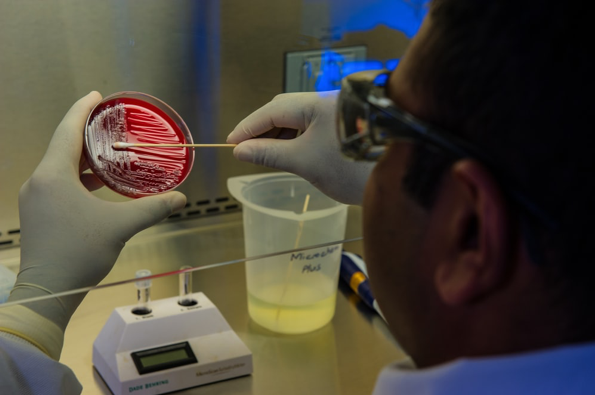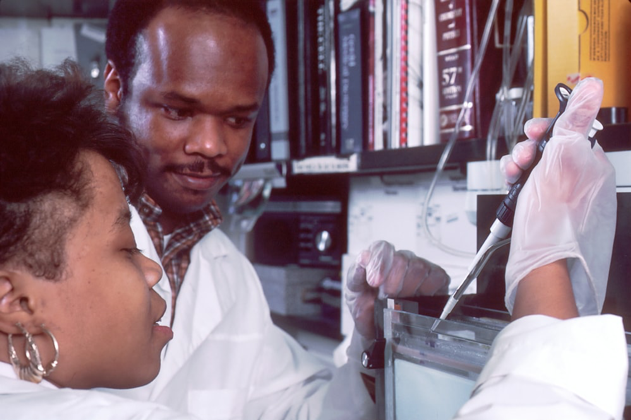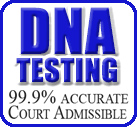Open on Evenings & Holidays! Extended And Flexible Hours!
* DNA Testing for Immigration
* Paternity Testing
* Deceased Paternity
* Forensic Testing & Much More!
Open on Evenings & Holidays! Extended And Flexible Hours!
* DNA Testing for Immigration
* Paternity Testing
* Deceased Paternity
* Forensic Testing & Much More!
What is forensic DNA testing? DNA testing is essential for the research process. Various fields rely on DNA testing (for instance, forensic science, genealogy, agriculture, medicine, and many more). DNA stands for the term deoxyribonucleic acid. DNA helps human cells function properly. In fact, DNA is the blueprint that contains information for encoding proteins and other components of the cell. You can understand how essential DNA testing is through medical, research, and judicial perspectives. Below, we will talk about how important DNA is for Forensic testing and how professionals perform Forensic DNA testing.

(Source)
Results from DNA testing can identify every individual separately. Authorities can apprehend a lot of criminals and solve cases with the help of Forensic DNA testing. In forensic DNA testing, investigators collect tissue samples from hair or blood found on the crime scene. After that, the technician identifies the person present at the crime scene or possibly involved in the crime. Results from forensic DNA testing also hold up as evidence in court. To reach a verdict, the police and judiciary system depends on DNA fingerprinting results’ power and credibility.
Scientists can determine the DNA profile through various body parts. These include cells, tissue, bone, teeth, hair, feces, urine, saliva, semen, and blood.
Through advancing technology, forensic scientists are developing the ability to analyze even smaller biological samples to develop a DNA profile. For instance, if someone touched a weapon or an object, they might leave some skin cells behind. Professionals refer to this type of DNA as touched DNA. They can also collect this DNA from bruises or the skin of victims, both alive or deceased.
When fingerprints are hard to retrieve, low-level DNA samples can be helpful. They can find these samples from gun handles, dashboards of the vehicle, or any other surface. However, only limited jurisdiction can process these types of evidence.
Technicians will compare the suspect’s DNA profile or the victim to the DNA recovered from the crime scene. For that, the laboratory should have their known samples ready so that they can compare them easily. Analysts call these samples reference samples. Various jurisdictions collect samples from the arrestee daily during fingerprinting and booking. However, this law about collecting samples from the arrestees is evolving and can vary depending on states. TO collect the reference from an arrestee, they sometimes require an order from the court. Investigators can gather Reference samples from the suspect unless they are not cooperating. For that, they will need a court order.
Other than reference samples, investigators will also collect elimination samples from other personnel. These can include first responders, analysts, and crime scene personnel who are working on the case. By testing their samples, investigators can eliminate them from the investigation.
Properly collecting the biological evidence is essential, but preserving it is more so. Exposure to humidity or heat may degrade the samples. Therefore, technicians store evidence in a cool environment. If the stains are dry, storing them in a cool place rather than at room temperature is unnecessary. However, the samples should be away from any humidity. Liquid samples should be in an insulated or refrigerated container.

(Source)
DNA analysts who are working in the laboratory participate in the NDIS (National DNA Index System). Analysts should receive their certification from a recognized organization such as AABB and the specific training and educational requirements. The minimum requirement is a bachelor’s degree in chemistry, biology, or in a field related to forensic science. Furthermore, the analyst must complete nine hours at a graduate or undergraduate level in various subjects. These include molecular biology, genetics, biochemistry, etc. They should also have training or course work in population genetics or statistics as they are essential to forensic DNA analysis.
For ensuring the analysts’ skills are up to date, the analysts working in a criminal laboratory should also update their education. The FBI has defined these requirements in the QAS or Quality Assurance Standards. You can refer the specialist conducting the DNA analysis in a laboratory with various titles, such as Forensic Laboratory Analyst, Forensic Scientist, Forensic Examiner, and Crime Laboratory Analyst.
The DNA samples that a laboratory receive go through the following steps:
The analyst will release the DNA from the cell.
Next, they will define the quantity of DNA.
For characterizing the DNA, the analyst will produce multiple copies.
This process permits the identification of the amplified DNA through separation.
This is the qualitative and quantitative comparison of the DNA evidence from the DNA profiles.
In this process, the analyst’s reports undergo reviews for technical accuracy.
AB DNA Testing is a forensics lab accredited by AABB. Our friendly and professional technicians will help you understand how DNA testing works. They will also inform you about what steps you need to follow to retrieve the results. Suppose you are interested in DNA testing for immigration, Paternity and maternity DNA testing, or Forensic DNA testing. In that case, you can contact us at 718-701-0292, or you can visit our website for details regarding DNA testing.

AB DNA Testing Services
Phone: 718-701-0292
We offer New York’s BEST AND MOST AFFORDABLE DNA TESTING with a full range of services to verify family relationships.
We specialize in the following types of DNA tests:
• Paternity • Maternity • Grand-parenting • Sibling Relationship • Biological Relationship Studies • Twin Studies • Deceased Paternity • Forensic Testing • Child Identity Testing • Family Tree and Genealogy Testing
* EVEN LOWER PRICE THAN HOME DNA KITS.
* NO HIDDEN COSTS – Collection kits, photography, and fingerprinting all included.
* 99.9% (OR GREATER) ACCURACY.
* FINAL RESULTS ARE PRESENTED IN A NOTARIZED DOCUMENT IN A CLEAR AND CONCISE FORM.
* ALL RESULTS ARE COURT ADMISSIBLE.
* OVER 15 YEARS EXPERIENCE.
* NO REFERRALS NECESSARY!
* FAST AND PAINLESS SAMPLE COLLECTIONS, USING BUCCAL (Mouth) SWABS.
* SPANISH, PORTUGUESE, FRENCH AND CREOLE SPOKEN.
* PLEASE SEE TRANSLATIONS OF OUR SERVICES IN: SPANISH, BENGALI, URDU, CHINESE AND NEPALESE!
Located In Woodside Queens, easily reachable from all boroughs (Queens, Manhattan, Brooklyn, Bronx and Staten Island), Westchester, Nassau and Suffolk.
We can also schedule DNA tests at our network of collection sites throughout New York city.
Call us. We have found that in many cases, our personalized service can overturn your denial. We will call the passport office or immigration dept. for you and plead your case over phone verbally.
90% of time they will revoke your denial, as long as you get the required information to them quickly.
AB DNA TESTING SERVICES